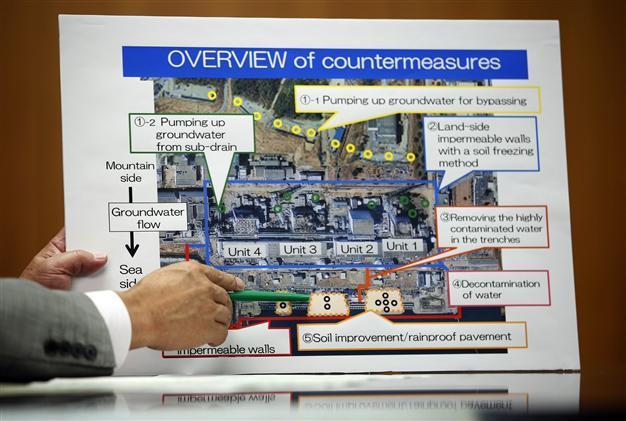Fukushima tank leak may have mixed with groundwater: TEPCO
TOKYO - Agence France-Presse

Japan's Economy, Trade and Industry Minister Toshimitsu Motegi points to a board showing an overview of countermeasures planned for Tokyo Electric Power Co. REUTERS Photo
Highly radioactive water leaking from a storage tank at Japan's crippled Fukushima nuclear power plant may have seeped into groundwater flowing towards the Pacific Ocean, the plant's operator said Thursday.It is the first time that Tokyo Electric Power (TEPCO) has revealed that leaks from the tank -- situated behind the plant reactor -- could also be polluting the groundwater beneath the plant. TEPCO has previously admitted that radiation has seeped from the plant's reactors into the groundwater and out to sea.
About 300 tonnes of irradiated water leaked from one of around 1,000 storage tanks last month.
TEPCO said Thursday that workers had detected radiation of 650 becquerels per litre in samples from a monitoring well dug near the damaged tank.
"There is the possibility that the contaminated water (from the tank), diluted by rainwater and others, has seeped into soil and reached groundwater," TEPCO said in a press release.
The groundwater from the surrounding hillsides naturally flows beneath the plant and out to sea.
As it seeps through the soil it mixes with polluted fluid that has seeped into the ground under the reactors. The government said on Tuesday it would spend $470 million on a scheme to freeze the soil around the stricken reactors to form an impenetrable wall of ice they hope will direct groundwater away from the plant.
Thousands of tonnes of radioactive water are being stored in the temporary tanks at Fukushima. Much of it has been used to cool molten reactors at the plant wrecked by the earthquake and tsunami of March 2011.
The discovery of leaks from some of these tanks or from pipes feeding them, as well as radiation hotspots on the ground even where no water is evident, has created a growing sense of crisis.
In a minor incident, the arm of a 600-tonne crane being used to remove debris at the plant was found bent down, TEPCO said in another press release.
Plant workers confirmed that damage had been done to a part where the crane's arm was connected to its main mast, the statement said.
















